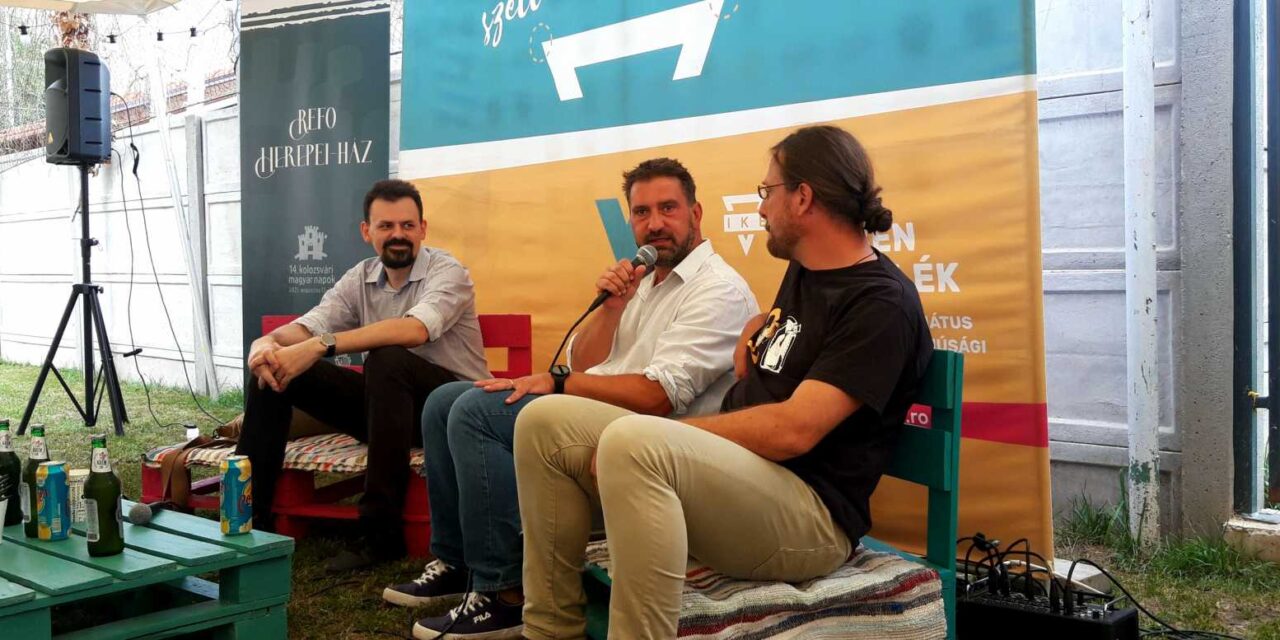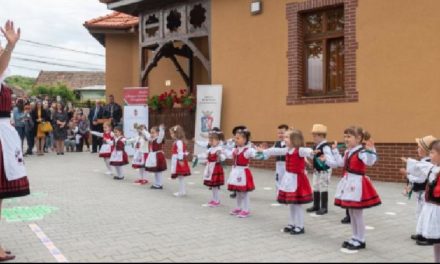organized as part of the Hungarian Days in Cluj . The round table discussion entitled "Challenges of university chaplains" took place on Tuesday afternoon in the courtyard of the recently inaugurated Herepei House.
István Vitus-Bulbuk, director of the Apafi Mihály Reformed University College, moderated István Dávid, pastor of the university students in Cluj and Félix Furó, university pastor in Marosvásárhely.
Beer with the priest, organized by the Transylvanian Reformed Church District and the Youth Association, took place in a family atmosphere in the courtyard of the REFO Herepei house Roundtable discussion on the challenges of university chaplains
The invited university chaplains have been on the field for a long time, during this time they have experienced how refreshing it is to work together with young people, but at the same time how difficult the separation they sometimes face.
Félix Fúró began his career in the Bákó Reformed Missionary Church Community, where he served for more than nine years as the only Reformed minister in four counties. He first met the university congregation in Iași, which consisted of three university students, but after the three persons finished their studies, the story ended. Then there was a vacancy in Marosvásárhely, where they were looking for a university chaplain, to which he applied, and has been active there ever since. At first, István Dávid did not want to follow in his father's footsteps and become a pastor, but this became his vocation. With his two children and his wife, he moved to Felső-Nýárádmente, then to Márkod and Kendő, where he served for five years, after which they returned to Cluj, which he believes was the best decision they could have made.
They both agreed on the question of what a good university pastor is: one who is there among the young.
According to István Dávid, this is becoming more and more difficult, because "in the city, the walls and spaces have become exposed and the places where you can reach them have become almost impassable". He added that patience, generosity and tact are essential to be present in a pastor and in a spiritual care provider, and thereby reach a young person.
"Nowadays, I see that it is not only fashionable in obstetrics that doctors, in their impatience, prescribe caesarean section from the outset for mothers capable of giving birth naturally, but also in the great religious upheaval, we want to give birth very quickly and violent births also happen, even though we have to wait"
- He told.
According to Félix Fúró's own admission, he wants to be present in the lives of young people as a spiritual leader, someone who does not need to be pampered, does not need to keep a distance and can be addressed at any time.
"A lot of people are surprised at first how this is possible, because they haven't experienced this at home. I don't feel that this would in any way detract from my position or that I would lose my authority, but I see that this is how I can get close to them"
he declared. At the same time, he added, as the years passed, it became more and more difficult for him.
Although the work of university chaplains seems simple and seems like they have endless time, this is not true at all. István Dávid said that it is difficult to measure in hours how much time he spends with young people, sometimes there are meaningful programs and discussions from Monday to Sunday, but there are also times when the opposite is typical. University students from Cluj meet on Tuesdays, Thursdays and Sundays, and further programs and events are organized around them. In Marosvásárhely, the weeks take place in the same way, and in addition to these there are other activities that last for a few days or months, depending on how the school year unfolds.
The peculiarity of the university church is that it appeals to a certain stratum, young people are in a period of life when many things are decided, many things need to be put right, for example the relationship with parents or relationship issues. According to István Dávid
"the university chaplain is like a specialist in the medical community who reaches out in one direction. It is a congregation because these people gather for the reason - apart from wanting to belong to a good community - because they want to know God better, and for this they are looking for language, space, methods and crutches"
he added.
Félix Fúró highlighted two reasons why young people go to church, according to him, they don't go because they are forced to, but because they have a spiritual hunger and are looking for a place where they can fill it and find answers to their questions.
"The other is that the majority is there not only to receive, but also to serve"
he pointed out. At the same time, they serve not only each other, but also outside, they go to children's homes and old people's homes, donate blood when needed and help where needed.
According to the university pastors, it is very difficult to live with the fact that church members are completely replaced from time to time, and with that, the mentality, needs and life stories also change, which they have to keep up with. According to Félix Fúró, it is important for them to be aware that their job is to guide and accompany church members during the given period, and to encourage them to participate in the life of their own church later on.
Featured image: Maszol/Helga Megyesi













